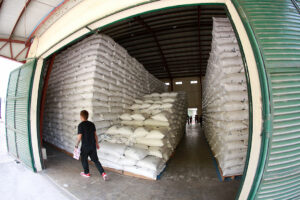




January Economic Update: Growth slows, prices rise
 DOWNLOAD
DOWNLOAD

Inflation Update: Up, up, and away?
 DOWNLOAD
DOWNLOAD

Quarterly Economic Growth Release: Growth takes on a slower pace
 DOWNLOAD
DOWNLOAD


Government warned against low tariff regime

Trade protection is needed if the government is serious in rescuing its agriculture and manufacturing sectors, experts said after the Philippines announced a new low tariff regime covering industrial and agricultural products.
Farmers, meanwhile, said the government has failed to keep its promise that it would not reduce tariffs for sensitive agricultural commodities while the Philippines is still a party to the world’s largest free trade agreement.
The country has been lowering tariffs since the early 1980s, with manufacturing falling to its smallest share of economic output since 1949 and agriculture down to its smallest in the country’s history, said Jose Enrique A. Africa, executive director of think tank Ibon Foundation.
“Mindlessly cutting tariffs further will just continue this long-term trend of weakening agriculture and manufacturing,” he said in a Facebook Messenger chat.
The National Economic and Development Authority (NEDA) Board on Monday approved a medium-term plan to lower tariffs on agricultural and industrial products, amid concerns over rising inflation, and slowing manufacturing output.
Under the Comprehensive Tariff Program for 2024 to 2028, the government would keep the rates for more than half of the tariff lines for products that have relatively low tariffs, a move that NEDA Secretary Arsenio M. Balisacan said would boost manufacturers’ competitiveness.
“Agricultural and industrial competitiveness is, most of all, built up from the ground with state subsidies and support to build capacity astride judicious trade and tariff protection,” Mr. Africa said.
He cited the case of the United States, which has been on a mission to subsidize its manufacturing sector amid growing competition with China, which accounted for 28.4% of global manufacturing output last year.
“If an industrial power like the US sees the need for protection, it’s bizarre that the underdeveloped Philippines somehow thinks otherwise,” he said.
Under the tariff program, the reduced tariff rates for corn, pork and mechanically deboned meat that started in 2019 would be kept until 2028. Rice tariffs will go down to 15% from the current 35% until 2028.
Raul Q. Montemayor of the Federation of Free Farmers lamented that the government earlier assured farmers that rice and other sensitive agricultural commodities would not suffer any diminution in tariff protection while the Philippines is part of the Regional Comprehensive Economic Partnership (RCEP).
The National Government has also failed to consult stakeholders before deciding to lower tariffs for industrial and agricultural products including rice, he added in a Viber message.
“NEDA has deprived industry stakeholders of their right to genuine consultation and due process,” he said.
Proposed tariff changes have to undergo hearings conducted by the Tariff Commission, which will then give the recommendations to the NEDA Board chaired by the President.
Mr. Montemayor said further reduction in rice tariffs would “hugely” affect the “morale and productive efforts” of three million domestic rice farmers and the rice industry as a whole, noting that the country’s dependence on rice imports has grown to 25% from 10%.
“Our experience since trading in the rice industry was liberalized… and tariffs were lowered also on non-ASEAN (Association of Southeast Asian Nations) rice imports has not been salutary. But rice retail prices have risen,” he said. “That the 15% tariff on rice will provide major and lasting relief to consumers is more a shot in the dark than a probable result.”
The Samahan ng Industriya ng Agrikultura said that when the Finance department last year announced plans to lower rice tariff, Vietnam and Thailand started to increase rice prices to USD 680 per metric ton (MT) from USD 630/MT of the 5% broken rice variety.
Non-ASEAN rice exporters like India and Pakistan simply increased their export tax, it said in a Viber message.
As of end May, the Philippines has already imported two million MT of rice, equivalent to 53% of projected imports.
The agriculture sector’s contribution to the gross domestic product last year fell to 8.6% — the smallest in the country’s history — from 9.55% a year earlier.
Political economy researcher Hansley A. Juliano from the Ateneo de Manila University noted the farm sector’s weakening power in terms of policy lobbying.
“Unfortunately, our farmer sector is getting older so just by themselves, even the successful agrarian reform beneficiaries and cooperative farm movements, they’re not really a strong lobby,” he said via Messenger chat.
Meanwhile, the government’s move to reduce tariffs on coal is unlikely to lower the cost of electricity as coal prices continue to rise, Greenpeace Philippines campaigner Khevin Yu said via Messenger chat.
He said the move will prolong the country’s reliance on coal and affect its transition to renewables.
“The best way to reduce electricity cost is to utilize the cheapest source of energy which is renewable energy,” he added, blaming “faulty operational capacity” of coal-fired power plants that led to yellow power alerts across the main island of Luzon.
A 2024 Green Economy Report for Southeast Asia led by Bain & Company said the Philippines saw a 57% increase in “green” investments to USD 1.46 billion in 2023, but still falls short of the over USD 16 billion in required capital investments needed for its green transition.
“NEDA should instead create more incentives for power generators, distributors and even for electric consumers who use renewables,” Mr. Yu said. — By Kyle Aristophere T. Atienza, Reporter
This article originally appeared on bworldonline.com





 By BusinessWorld
By BusinessWorld